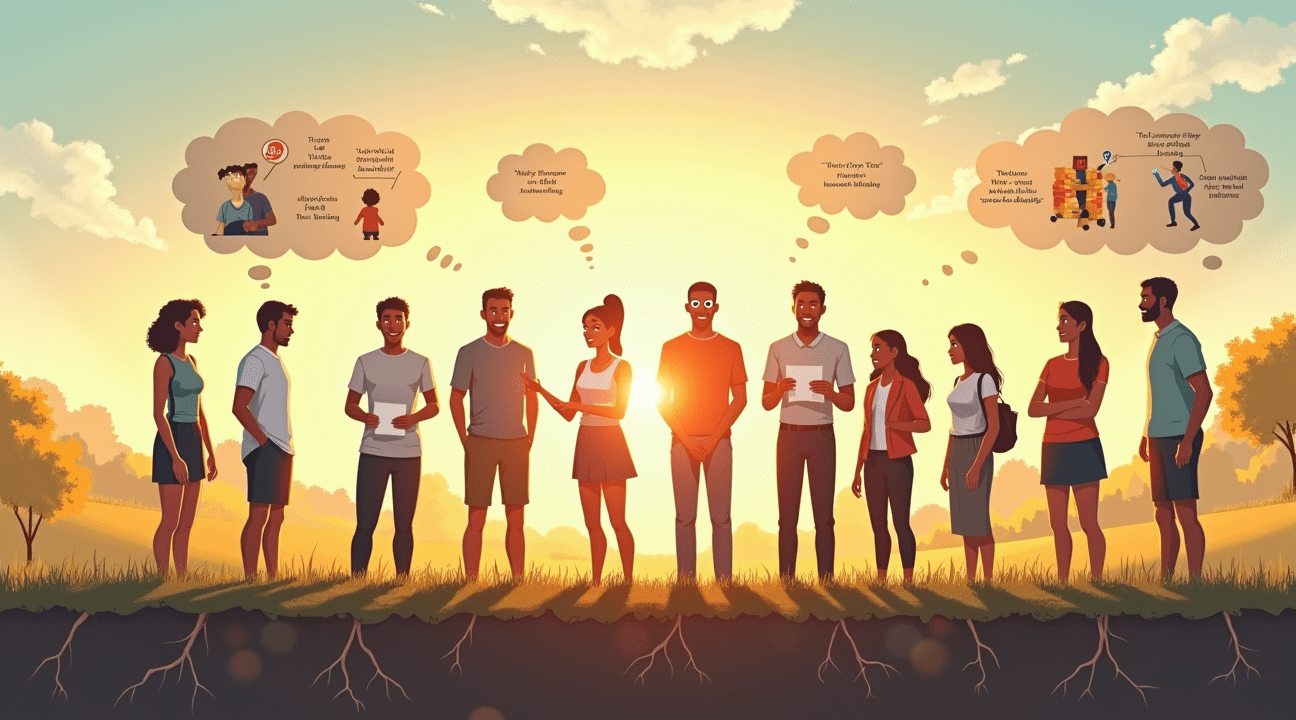The Harvard Study of Adult Development’s 84-year research reveals that strong relationships serve as the most reliable predictor of happiness and longevity, while mental discipline and resilience-building through constructive responses to failure form the foundation for personal growth and achievement.
Key Takeaways
- Strong relationships extend life and increase happiness – People with close social bonds consistently outperform isolated individuals in measures of emotional well-being and longevity, while chronic loneliness increases death risk by 26% annually.
- Mental discipline prevents negative thoughts from controlling life – Developing mindfulness practices, positive self-talk, and reframing techniques transforms automatic reactions into conscious choices, building confidence and emotional stability.
- Failure becomes valuable feedback when approached constructively – Resilience grows through treating setbacks as learning opportunities rather than personal defects, focusing on effort and improvement while maintaining realistic expectations.
- Persistence matters more than talent for long-term success – True failure only occurs when someone stops trying, as each attempt builds problem-solving skills and resilience that compound over time.
- Giving creates more lasting fulfillment than getting – Contributing to others’ success through mentoring, volunteering, or sharing knowledge triggers natural reward responses and builds stronger relationships than focusing solely on personal accumulation.
To learn more about this ongoing research, visit the Harvard Study of Adult Development website for detailed findings and insights into what truly makes life meaningful and fulfilling.
The Power of Relationships Determines Your Longevity and Happiness
Strong relationships stand as the most reliable predictor of happiness and long-term well-being in human life. The Harvard Study of Adult Development, spanning an impressive 84 years of research, reveals that people with close relationships enjoy significantly better health and happiness throughout their entire lifespan.
The Science Behind Social Connection
Relationships aren’t just emotionally fulfilling—they’re literally life-extending. Whether you maintain deep friendships, romantic partnerships, or active community involvement, these connections create a protective shield around your physical and mental health. The research shows that individuals with strong social bonds consistently outperform their isolated counterparts in measures of emotional well-being and longevity.
Chronic loneliness poses a severe threat to human health, increasing the risk of death by 26% in any given year according to the Harvard Study of Adult Development. This statistic places social isolation on par with smoking or obesity as a major health risk factor. Your body experiences loneliness as a form of chronic stress, triggering inflammation and weakening immune function over time.
Building Meaningful Connections
Cultivating relationships requires intentional effort, much like maintaining physical fitness. Quality matters more than quantity when building your social network. A few genuine connections provide more benefit than numerous superficial acquaintances. Regular contact strengthens these bonds, whether through phone calls, shared meals, or participating in group activities.
I’ve observed that embracing life involves accepting where you are while actively seeking meaningful connections. Community involvement offers excellent opportunities to meet like-minded individuals who share your interests and values. Volunteering, joining clubs, or participating in local events creates natural environments for relationship building.
The emotional well-being that flows from strong social connections creates a positive feedback loop:
- Happy people attract others more easily
- New relationships are easier to establish and maintain
- Support from others boosts self-esteem and resiliency
Conversely, isolation breeds more isolation, creating a downward spiral that becomes increasingly difficult to escape.
Your relationships directly impact your physical health through multiple pathways:
- Social support reduces stress hormones
- It lowers blood pressure
- It strengthens immune function
- It speeds recovery from illness
- It enhances resilience during life’s challenges
Investment in relationships pays dividends that compound over decades. The friends you nurture today become your support system during future crises. The community connections you build create a safety net that catches you when life inevitably throws curveballs your way.
Rule Your Mind Before It Rules You
The ancient wisdom embedded in the phrase “rule your mind or it will rule you” captures one of life’s most critical truths. Mental discipline forms the foundation for everything we achieve, yet most people allow negative thoughts and self-doubt to dictate their daily experiences. I’ve discovered that gaining mastery over these destructive patterns transforms not just individual moments, but entire life trajectories.
Negative thinking operates like a default program, running automatically unless we consciously intervene. Self-doubt whispers that goals remain out of reach, while negativity filters experiences through a lens of limitation and fear. These mental habits compound over time, creating cycles that become increasingly difficult to break without deliberate intervention.
Practical Approaches for Mental Mastery
Developing emotional health requires consistent application of proven techniques that interrupt negative thought cycles:
- Mindfulness practices create space between thoughts and reactions, allowing conscious choice rather than automatic responses
- Positive self-talk replaces internal criticism with supportive dialogue that builds confidence and resilience
- Reframing negative experiences involves finding constructive meanings or lessons within challenging situations
- Regular meditation strengthens the mental muscle needed to observe thoughts without being controlled by them
- Journaling helps identify recurring negative patterns and track progress in developing healthier thinking habits
These strategies require patience and persistence, much like building physical strength through consistent exercise. Mental discipline doesn’t develop overnight, but small daily practices accumulate into significant changes over months and years.
The transformation becomes evident when challenges arise and automatic responses shift from panic to problem-solving, from self-criticism to self-compassion. This shift affects relationships, career decisions, and overall life satisfaction. Instead of being victims of circumstance, individuals learn to respond from choice rather than react from fear.
Building this foundation of mental control creates ripple effects across all life areas. Confidence grows as self-doubt decreases. Opportunities become visible that were previously hidden by negative assumptions. Relationships improve when interactions come from a place of emotional stability rather than insecurity.
Understanding that thoughts can be observed, questioned, and redirected empowers people to break free from limiting beliefs that have operated unconsciously for years. The mind becomes a tool rather than a master, serving goals and values instead of sabotaging them.
This principle connects to broader wisdom about personal development and taking responsibility for one’s experience. Just as motivational insights can inspire positive change, developing mental discipline provides the practical skills needed to sustain that inspiration over time. The ability to direct mental energy becomes the foundation for achieving meaningful goals and maintaining long-term happiness.

Building Resilience Through Constructive Responses to Failure
I’ve observed that one of life’s most valuable lessons lies in how we respond when things don’t go according to plan. Failure isn’t the opposite of success—it’s a stepping stone that builds character and resilience. The ability to bounce back from setbacks determines not just our immediate recovery, but our long-term capacity for growth and achievement.
Developing effective coping mechanisms starts with understanding that mistakes are learning opportunities rather than personal defects. When I examine how successful individuals handle disappointment, they share a common trait: they reframe failure as feedback. This mental shift transforms devastating experiences into valuable data points for future improvement.
Core Strategies for Constructive Response
Effective coping skills form the foundation of emotional resilience. Consider these essential approaches:
- Practice positive self-talk by replacing harsh self-criticism with encouraging statements
- Focus on effort and improvement rather than perfect outcomes
- Support others during their difficult moments to build community resilience
- Analyze what went wrong without dwelling on blame or shame
- Set realistic expectations while maintaining ambitious goals
Research from afterschool sports programs demonstrates how participants who learn to say “You can do better next time” to themselves and teammates develop stronger emotional adaptability. This encouragement creates an environment where setbacks become motivational fuel rather than sources of discouragement.
The growth mindset concept proves particularly powerful when dealing with failure. Individuals who believe abilities can be developed through dedication and hard work view challenges differently than those with fixed mindsets. They see effort as the path to mastery, not as a sign of inadequacy. This perspective transforms every setback into a chance to strengthen skills and knowledge.
Constructive feedback plays a crucial role in this process. Learning to give and receive criticism without taking it personally requires emotional maturity, but the payoff is substantial. When I provide feedback to others, I focus on specific behaviors and outcomes rather than character judgments. Similarly, receiving feedback becomes easier when I separate my actions from my identity.
The distinction between winning and losing often creates unnecessary pressure that impedes growth. Motivational insights remind us that true success comes from personal progress rather than comparative outcomes. This doesn’t mean abandoning competitive drive, but rather channeling it in healthy directions.
Emotional adaptability emerges naturally when we practice these response patterns consistently. The teenager who learns to encourage discouraged teammates develops empathy and leadership skills that extend far beyond sports. The student who analyzes poor test performance without self-condemnation builds analytical thinking and emotional regulation.
Building resilience requires deliberate practice in low-stakes situations. Start by paying attention to your internal dialogue during minor frustrations. Notice whether you default to self-criticism or problem-solving. Gradually work up to applying these skills during more significant challenges.
Educational wisdom emphasizes that failure often precedes breakthrough moments. The key lies in maintaining persistence while adapting strategies. This balance prevents both stubborn repetition of ineffective approaches and premature abandonment of worthwhile goals.
Social support amplifies individual resilience efforts. Surrounding yourself with people who model constructive responses to failure provides both encouragement and practical examples. The most resilient communities I’ve encountered share failures openly, discuss lessons learned, and celebrate recovery as much as initial success.
The long-term benefits of these practices extend beyond personal achievement. Resilient individuals contribute to stronger families, more innovative workplaces, and more supportive communities. They become the people others turn to during crises because they’ve learned to transform challenges into opportunities. This ripple effect means that investing in your own resilience skills ultimately benefits everyone in your sphere of influence.

Why You Never Really Lose Until You Stop Trying
I’ve learned that the most profound truth about success isn’t found in talent or natural ability—it’s discovered in the simple act of refusing to quit. The phrase “you never really lose until you stop trying” captures a fundamental principle that separates those who achieve their goals from those who fall short.
The Power of Persistent Effort
Persistence transforms ordinary individuals into extraordinary achievers. When I examine the patterns of successful people across various fields, one characteristic stands out consistently: they continue moving forward despite setbacks. This trait proves more valuable than raw talent or favorable circumstances. Research consistently demonstrates that sustained effort over time produces better outcomes than sporadic bursts of brilliance.
Consider how many breakthrough moments occur after multiple attempts:
- Scientists conduct hundreds of experiments before discovering life-changing innovations.
- Athletes endure countless defeats before achieving championship victories.
- Entrepreneurs face numerous rejections before finding investors who believe in their vision.
Each “failure” serves as valuable data, teaching lessons that bring them closer to success.
Redefining Failure and Success
I’ve come to understand that failure isn’t a permanent state—it’s temporary feedback. True failure only materializes when someone abandons their pursuit entirely. Every setback contains information about what doesn’t work, gradually revealing the path to what does work. This perspective shift changes everything about how we approach challenges.
The most successful individuals treat obstacles as puzzles to solve rather than walls to stop them. They understand that each attempt builds resilience and develops problem-solving skills. When facing difficulties, they ask better questions:
- “What can I learn from this?” instead of
- “Why is this happening to me?”
This mindset creates momentum even during tough times.
Resilience grows stronger with each challenge overcome. Like muscle fibers that strengthen after being stressed, our capacity to handle adversity expands through experience. Those who persist through multiple setbacks develop an unshakeable confidence in their ability to find solutions.
The key lies in maintaining forward motion, even when progress feels imperceptible. Small, consistent actions compound over time, creating remarkable results. I’ve witnessed countless examples of people who seemed to “suddenly” achieve success after years of steady effort. Their victory wasn’t sudden—it was the culmination of persistent action over extended periods. Motivational wisdom reminds us that consistency beats intensity when pursuing long-term goals.
Success often arrives just beyond the point where most people give up. Those who understand this truth gain a significant advantage. They recognize that their willingness to continue when others quit creates opportunities that wouldn’t otherwise exist. This knowledge transforms their relationship with difficulty from something to avoid into something to embrace as a competitive advantage.

The Fulfillment Found in Giving Rather Than Getting
I’ve discovered through personal experience and observation that the act of giving creates a profound shift in how we experience life. When individuals focus their energy on contributing to others rather than accumulating for themselves, they tap into a source of satisfaction that material gains simply can’t provide. This shift from a getting mindset to a giving mindset fundamentally changes how success is measured and felt.
The psychology behind giving reveals why contribution feels so rewarding. Acts of generosity trigger the release of endorphins and create what researchers call a “helper’s high.” This natural response explains why volunteers often report feeling energized rather than depleted after helping others. The brain processes giving as inherently rewarding, creating positive feedback loops that encourage continued generous behavior.
Individuals who prioritize contribution over accumulation demonstrate measurably different life satisfaction patterns. They tend to build stronger relationships, experience less anxiety about their own circumstances, and develop a more secure sense of self-worth. While those focused solely on personal gain often find themselves on a hedonic treadmill—constantly needing more to feel satisfied—generous people find contentment through impact rather than acquisition.
Practical Ways Giving Transforms Daily Life
The transformation from getting to giving manifests in various practical forms that enhance daily experience. Consider these approaches that create lasting fulfillment:
- Mentoring colleagues or community members builds expertise while creating meaningful connections
- Volunteering time for causes you care about provides perspective on personal challenges
- Sharing knowledge through teaching or educational support reinforces your own learning
- Offering emotional support during difficult times strengthens social bonds
- Contributing resources to help others achieve goals creates ripple effects of positive change
Traditional success metrics focus heavily on personal achievement—salary increases, promotions, possessions, or status symbols. However, those who measure success through their positive impact on others often experience more sustained satisfaction. A promotion feels good temporarily, but knowing you’ve helped someone else succeed creates lasting meaning that compounds over time.
The contrast becomes clear when examining long-term outcomes. People who spend decades focused primarily on personal advancement often reach their goals feeling unexpectedly empty. They’ve climbed their mountain only to discover the view isn’t as fulfilling as anticipated. Conversely, those who’ve consistently contributed to others’ success along their own journey find their achievements feel richer and more meaningful.
This principle applies equally to financial decisions and life choices. Smart money management can free up resources for giving, while thoughtful spending on others often provides more lasting satisfaction than self-focused purchases. The joy of enabling someone else’s dream vacation or education creates memories and meaning that self-indulgent spending rarely matches.
Contribution doesn’t require grand gestures or significant resources. Small acts of generosity practiced consistently create compound benefits for both giver and receiver. Listening actively when someone needs to talk, sharing expertise during a colleague’s project, or simply acknowledging others’ efforts contributes to a culture of support that benefits everyone involved.
The fulfillment found in giving extends beyond immediate emotional rewards. Generous people tend to build stronger professional networks, not through calculated networking but through genuine relationship-building. They create environments where others want to succeed, which naturally leads to collaborative opportunities and mutual support. This approach to success feels more sustainable because it doesn’t depend solely on individual effort or luck.
Understanding this dynamic changes how I approach daily interactions and long-term goals. Instead of asking “What can I get from this?” I’ve learned to ask “What can I contribute here?” This shift in questioning leads to different choices and, ultimately, different outcomes. The satisfaction derived from helping others succeed creates a foundation for personal fulfillment that material success alone cannot provide.
The lesson isn’t that personal goals don’t matter, but rather that pursuing them while simultaneously contributing to others’ success creates a richer, more satisfying life experience. Motivational wisdom consistently points to this truth: lasting fulfillment comes from what we give, not what we get.

Statistical Thinking and Lifelong Learning for Better Decision-Making
Statistical literacy forms the backbone of sound decision-making throughout life. I’ve discovered that understanding fundamental concepts like correlation versus causation prevents countless misguided choices and assumptions. When people observe two events occurring together, they often assume one causes the other, yet this assumption frequently leads to poor conclusions. For instance, noticing that successful people wake up early doesn’t mean early rising guarantees success—multiple factors contribute to achievement beyond morning routines.
Regression to the mean represents another crucial concept that reshapes how I interpret life events. Extreme outcomes, whether exceptionally good or bad, typically move closer to average over time. A student who scores perfectly on one test shouldn’t expect perfect scores consistently, just as someone experiencing a terrible week shouldn’t assume their luck has permanently changed. This understanding prevents both overconfidence during peak moments and despair during low points.
Essential Principles for Better Critical Thinking
Several key principles enhance decision-making through statistical awareness:
- Recognition that sample sizes matter—one negative restaurant experience doesn’t define the entire establishment
- Understanding that patterns require sufficient data points before drawing conclusions
- Awareness that randomness plays a larger role in outcomes than people typically acknowledge
- Appreciation for base rates when evaluating unusual events or claims
- Consideration of selection bias when hearing success stories or failure accounts
These principles help avoid common cognitive traps that plague everyday reasoning. I apply them when evaluating investment opportunities, career moves, and relationship decisions. Rather than relying on single anecdotes or dramatic examples, statistical thinking encourages examining broader patterns and considering alternative explanations.
Embracing humility becomes essential for continuous growth and improved judgment. I’ve learned that admitting knowledge gaps opens doors to new understanding rather than exposing weakness. Teachable individuals adapt more successfully to changing circumstances because they remain open to contradictory evidence and fresh perspectives. This mindset proves particularly valuable when seeking knowledge that challenges existing beliefs or assumptions.
Lifelong learning complements statistical thinking by providing diverse frameworks for analyzing problems. Each new skill or concept adds another lens through which to examine situations. Personal growth accelerates when combining analytical rigor with intellectual curiosity. I find that questioning my own conclusions regularly leads to better outcomes than defending initial impressions.
Real-life applications demonstrate these concepts’ practical value. Consider someone who receives three job rejections and concludes they’re unemployable. Statistical thinking suggests examining the broader job market, application quality, and interview performance rather than assuming personal inadequacy. Similarly, parents who panic after their child struggles in one subject might benefit from understanding normal academic variation and long-term learning patterns.
Financial decisions particularly benefit from statistical awareness. Market volatility appears less threatening when understood as normal fluctuation rather than personal financial failure. Investment choices improve when based on historical patterns and diversification principles rather than recent performance or emotional reactions. Money-saving strategies work more effectively when evaluated through systematic analysis rather than anecdotal recommendations.
Relationship dynamics also respond well to statistical reasoning. One argument doesn’t predict relationship failure, just as one romantic gesture doesn’t guarantee lasting love. Understanding relationship patterns helps maintain realistic expectations while working toward improvement. Communication improves when both parties recognize that isolated incidents rarely represent overall relationship quality.
Career development benefits enormously from this analytical approach. Professional setbacks become learning opportunities rather than defining moments when viewed through statistical understanding. Skill development progresses more steadily when individuals recognize that improvement follows general patterns rather than linear progression. Motivational insights become more meaningful when grounded in realistic expectations about growth timelines.
Statistical thinking transforms how I approach personal challenges and opportunities. Instead of making decisions based on fear or overoptimism, this framework encourages balanced evaluation of available information. Combining analytical skills with humility and continuous learning creates a powerful foundation for navigating life’s uncertainties while making progressively better choices across all areas of experience.
Sources:
Harvard University – “Over nearly 80 years, Harvard study has been showing how to live a healthy and happy life”
Next Big Idea Club – “Good Life Lessons From the World’s Longest Scientific Study of Happiness”
Massachusetts General Hospital Psychiatry – “Good Life Lessons From the World’s Longest Scientific Study of Happiness”
National Center for Biotechnology Information (NCBI)
Inc. – “24 Most Powerful Life Lessons”
Joshua N. Hook – “8 Lessons From Statistics That Can Change Your Life”


